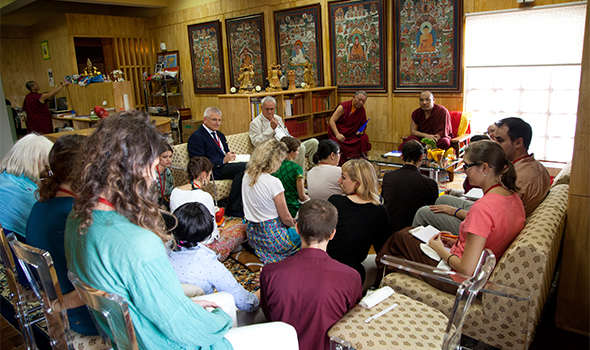
(Dharamsala- August 2014)
A group of 16 young people from Europe have completed a two-week programme of daily interactions with His Holiness the 17th Karmapa, Ogyen Trinley Dorje. Under the auspices of Karmapa Foundation Europe and under the guidance of Ringu Tulku Rinpoche, the group met for 10 private sessions with His Holiness to discuss a series of topics proposed by the students.
The young people hailed from 10 different European countries—Belgium, Denmark, France, Germany, Holland, Ireland, Poland, Slovenia, Spain and the UK—and represent a wide range of professional backgrounds, including medicine, law, technology, environmental sciences, fashion, engineering, mathematics, arts and music.
For much of the teachings, His Holiness taught directly in English. During their first meeting, each young person introduced him or herself to the Karmapa. His Holiness in turn expressed his delight at having the opportunity for this sustained engagement with Europeans and European culture. (Two months earlier, His Holiness the Karmapa had made his first-ever trip to Europe, visiting Germany for two weeks.)
“The Karmapa does not just belong to Tibetans,” he said, speaking in English. “The person holding that title belongs to the whole world, and therefore needs to be widely informed. Though it is difficult to know everything, that person needs to be aware of important world issues and have sound knowledge about them.”
Following the model developed by an earlier series of interactions with Western university students that led to the book The Heart Is Noble: Changing the World from the Inside Out, each session began with a brief presentation by the students on the topic of the day. Though delivered by two of the young people, each presentation was developed collectively by the entire group. The young people spent a total of ten hours together every day, discussing each topic in detail to develop their presentation to the Karmapa and to generate the final list of questions they would ask of him.
In the second session, the young people asked His Holiness to speak on community-building and working in teams in order to bring about social change and as part of a healthy life. For their third session, the discussion turned to leadership, with the students hearing from His Holiness both what the personal qualities of a good leader are, and how to cultivate those qualities themselves. From there, the group turned to peace-building and managing the conflicts that inevitably arise within groups as well as within individuals.
The next topic was education, starting with a presentation of the challenges facing mainstream educational institutions in Europe as well as a description of an alternative option by a teacher at one such school. Among the questions His Holiness responded to during this session were how to educate about death and dying, and how to shift the emphasis in our education system from getting a good job to becoming a good person.
In the sixth session, the discussion turned to the environment, but rather than focus primarily on environmental protection, the session revolved around the relationship between our inner personal environment and our surrounding environment, social or natural. His Holiness stressed that of the two—inner environment and outer environment— our inner environment is the more important factor determining whether or not we will be able to enjoy a healthy social environment or restore our planet’s natural environment.
The seventh interaction focused on how to move beyond a consumerist lifestyle. The presenters were careful to display both their disenchantment with consumerism as a way to find meaning and happiness, but also the sway it still holds over their lives and hearts. One of the presenters (a fashion designer from Holland) wryly noted that she herself had the Chanel logo tattooed on her body, twice! Among the questions His Holiness replied to during this session were how to recognize the emotional needs beyond our own personal patterns of consumption, and how to learn to rejoice in what others have instead of just wanting to acquire it for ourselves.
Addiction was the theme of the following session, and was explored as an extreme form of the consumerist attitude that continually chases after some form of external stimulus. The discussion explored substance abuse as well as addictive behaviours of all sorts, with His Holiness exploring the underlying causes of addiction and offering guidance for those whose loved ones suffer from addiction as well as for those seeking to free themselves from their own addictive behaviours.
The penultimate session turned to the question of spirituality. The group asked His Holiness to explain how spirituality might help them move past consumerism to create a more meaningful life and a healthier planet. At the same time, they described the thriving “spiritual marketplace” in Europe where many spiritual practices are available on offer. They therefore asked for guidance in identifying authentic teachers and spiritual paths and in avoiding falling into spiritual materialism in their own practice.
The final session addressed ways to apply in daily life everything that they had learned from His Holiness during their time together, and concluded with a request for the teachings given over these two weeks to be made available as a book.
On their final day in Dharamsala, the young people shared a meal with His Holiness the Karmapa. They offered music and song, ate and then bid him a poignant farewell after two intense and life-changing weeks of teachings from the Karmapa.


